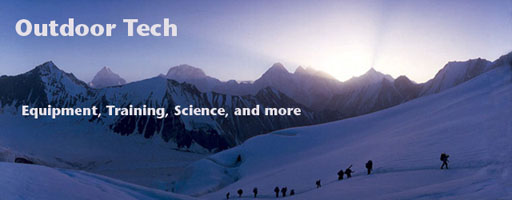 Half of the climbers in gyms and at crags have been injured bad enough in the past year that they had to take at least one day off. One third have chronic overuse injuries such as elbow and shoulder tendonitis. Over a quarter suffer an acute injury, such as a torn A2 pulley in a middle or ring finger, from pulling harder than their body could handle. Yet only 10% of the waylaying injuries came from a fall.
Half of the climbers in gyms and at crags have been injured bad enough in the past year that they had to take at least one day off. One third have chronic overuse injuries such as elbow and shoulder tendonitis. Over a quarter suffer an acute injury, such as a torn A2 pulley in a middle or ring finger, from pulling harder than their body could handle. Yet only 10% of the waylaying injuries came from a fall.
Thursday, March 06, 2008
Study: Climbing hurts
Posted by
Clyde
0
comments
![]()
![]()
Wednesday, February 27, 2008
Cramps and Myths
 The plague of many a runner, cyclist, climber, boater, and just about any other outdoor athlete, muscle cramps suck. But despite all the suffering, the cause of cramps remains poorly understood. Much of the early research, which was largely funded by Gatorade, has been debunked. Yet this weak science was the basis for a massive marketing campaign that resulted in myths that persist to this day.
The plague of many a runner, cyclist, climber, boater, and just about any other outdoor athlete, muscle cramps suck. But despite all the suffering, the cause of cramps remains poorly understood. Much of the early research, which was largely funded by Gatorade, has been debunked. Yet this weak science was the basis for a massive marketing campaign that resulted in myths that persist to this day.
Posted by
Clyde
0
comments
![]()
![]()
Tuesday, February 19, 2008
Study: Exercise and moderate drinking can be healthy
Posted by
Clyde
0
comments
![]()
![]()
Monday, February 04, 2008
Protein Power?
 Last week, the LA Times offered up a taste test of four different protein bars. The article also talks briefly about why and when you might want to consume these things, though it doesn't mention alternatives. The Clif Builder's bar came out on top but it's a dubious distinction when the panel found that they all taste artificial, this one just slightly less so.
Last week, the LA Times offered up a taste test of four different protein bars. The article also talks briefly about why and when you might want to consume these things, though it doesn't mention alternatives. The Clif Builder's bar came out on top but it's a dubious distinction when the panel found that they all taste artificial, this one just slightly less so.
Posted by
Clyde
0
comments
![]()
![]()

